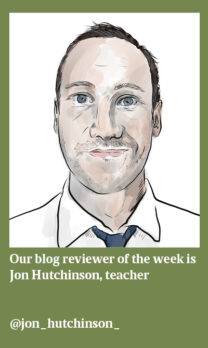@adamboxer1
When, in the thirteenth century, Aquinas rediscovered the works of Aristotle, he referred to him simply as “the Philosopher”, such was the comprehensive nature of his genius. I wonder whether two thousand years from now education faculties will refer to Adam Boxer as simply “the Teacher”, with blogposts like this one left in his corpus. Here, Boxer turns his critical lens onto questioning. It’s a unique and original take, as he argues that the taxonomy of higher- and lower- order questions (mis)attributed to Bloom is flawed and unhelpful. By presenting question-pairs and asking us “Which is more challenging?” Boxer forces us to abandon preconceptions around command words dictating difficulty. In a particular highlight, it is demonstrated that the same question can vary in difficultly simply through manipulating timing. If we’re lucky, we’ll all be footnotes to Boxer.
@elucymay
Many of us are going retrieval practice crazy in our classrooms at the moment, quizzing pupils on the key facts, people, concepts, dates and ideas relating to our subjects. In this hugely practical blog, English teacher Elisabeth Bowling details exactly how she goes about designing these quizzes in a handy step-by-step guide. For those starting out on the retrieval journey, it’s a wonderful short cut to success. But there is still plenty to learn for those of us who have been taking a less examined approach to retrieval than the method elucidated by Bowling here. I hope that this blog features in departmental meetings across the country.
How I… became a regional ambassador for RE – Laura Harris
@mrsharrisRE
I don’t think that it’s hugely controversial to say that RE is not taught particularly well in primary schools. A harsh generalisation, perhaps, but whenever I meet fellow primary teachers the response to “What do you do for RE?” is often the same: eyes darting, nervous shuffling, quickly changing the subject. We desperately need leadership in this too-often neglected area, and so Laura Harris’s blog on how she swerved away from secondary RE teaching to champion the subject within primary schools is most welcome. In this post, she explains how she became a regional ambassador for RE, and reveals some of the important work that she is doing to ensure all primary teachers have access to high-quality RE resources and best practice. I can’t wait to learn more from Laura’s work.
Clear Teacher Explanations I: examples & non-examples
@Mr_Raichura
If we want to be really reductive about it, teaching is largely and often just explaining things really well. It’s as simple and complex as that. One strategy that is too often overlooked is using examples and non-examples to clarify key concepts. Early years teachers will know this approach well, and are skilled in building abstract understanding through lots of concrete examples, as well as pointing to things which do not fall within the concept. But here, secondary science teacher Pritesh Raichura explains how he has shifted from “starting with a generalised definition…presenting a vacuous string of words, devoid of meaning” to “always begin[ning] with concrete examples”. Non-examples, he goes on to explain, “highlight concept boundaries”. There are (fittingly) ample examples taken from Pritesh’s subject, but this is a strategy that teachers of all ages and disciplines can capitalise on.
Librarians as Teachers and Information Skills Developers, Elizabeth Hutchinson
@Elizabethutch
As David Attenborough returns to our screens with a stark warning about the loss of flora and fauna through climate change, let’s turn our attention to the endangered species within education: the school librarian. In this blog, Elizabeth Hutchinson (no relation) discusses why well stocked libraries and professional librarians are more needed in schools today than ever before. Hutchinson outlines the core role of a school librarian, “to bring our expertise to education and the curriculum and through doing this help our schools understand the value that our libraries bring to their students and teachers”, before going on to offer four top tips to help librarians break away from their “traditional role” and “unleash their potential” for the benefit of the entire school.













Your thoughts